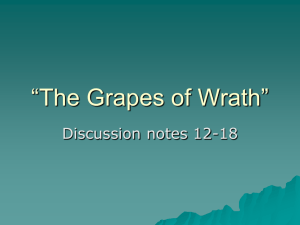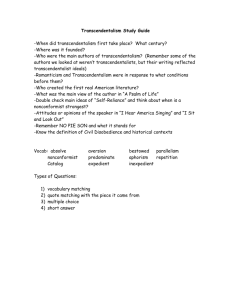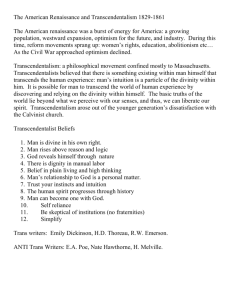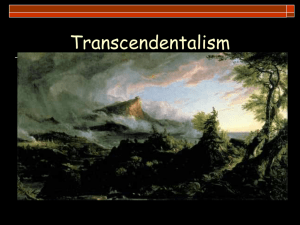“The Grapes of Wrath”
advertisement
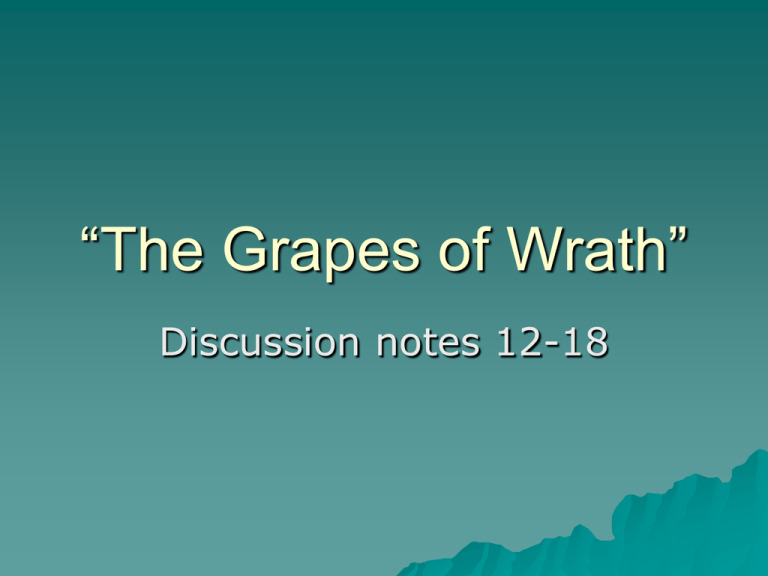
“The Grapes of Wrath” Discussion notes 12-18 American Transcendentalism A means of understanding the physical and spiritual world. A philosophical, religious, literary, and social movement which reached its peak in the 1830s-1840s. Emerson (as in, Ralph Waldo) proclaimed a form of transcendentalism whose genesis was in his abiding belief that each person could be in touch with the god within, as well as with the divine currents of the universe. American Transcendentalism Emerson looked for primary truth in the fundamental nature of the human mind. We have more in the mind than enters it through the senses. In his essay “Self Reliance” he asserts one of transcendentalism’s fundamental tenets: the dignity, the ultimate sanctity, of each human being. American Transcendentalism It’s murky, though. Transcendentalism’s commitment to the individual is a commitment to the soul or spirit that each person possesses in common with all other human beings. “There is one mind common to all individual men.” American Transcendentalism That means there is a social imperative, too: – The well-being of all individuals is the basic purpose for all social organizations. – Autonomous individuals cannot exist apart from others. There is a fundamental unity, a basic similarity, in all human experience, which is more important than the many obvious differences. This gave every human a sense of responsibility of self-esteem; everyone is part of something much bigger than themselves. He called this being part of something he called the “Oversoul.” Who does that sound like? Transcendentalism “Why do we got to hang it on God or Jesus? Maybe, I figgered, maybe it’s all men an’ all women we love; maybe that’s the Holy Sperit – the human sperit – the whole shebang. Maybe all men got one big soul ever’body’s a part of.’ Casy Discussion notes: Chapters 12-14 The Joads, perhaps subconsciously, have begun to follow Casy’s spiritual vision. Their merger with the Wilsons shows this: – When the Wilsons open their tent to the Joads, they are saying, “Welcome, brothers and sisters.” – Mrs. Wilson answers Ma’s thanks for help by saying: “People [have the need] to help. Ma later replies: “You can’t let help go unwanted.” Discussion notes: chapters 12-14 Theme: Anger and confusion: Anger, in many guises, dominates the book, and Steinbeck warns of this in Chapter 14: – Californians’ fear of the migrants turns to anger: “Keep two men apart; make them hate, fear, suspect each other.” – If you don’t, then “I lost my land” is changed: a cell is split, and from its splitting grows the thing you hate: “We lost our land.” – The danger is here, for two men are not as lonely and perplexed as one. And from this first “we,” there grows a still more dangerous thing: – “I have a little food” + “I have none” = We have a little food.” Discussion notes: Chapters 12-14 – This spontaneous sharing is seen when the Wilsons offer their tent for Grandpa to die in; Mrs. Wilson gives up a quilt to bury him in; she tears a page from her Bible for Tom to write a eulogy on. – Ma then pledges to care for Mrs. Wilson, and Pa later says, “We almost got a [family] bond.” – “I” becomes “We.” Naturalism Became the dominant literary movement in American fiction by the turn of the 20th century. Early naturalistic writers included Stephen Crane (“The Red Badge of Courage”); Jack London (“The Call of the Wild”); Theodore Dreiser (“An American Tragedy”). Many of their stories manifested Darwin’s theory of “survival of the fittest.” Naturalism is a form of extreme realism: “Human beings are animals in a natural world, responding to environmental forces and internal stresses and drives, over none of which they have control and none of which they fully understand.”1 1. C. Hugh Holman and William Harmon. A Handbook to Literature, 5th ed. (New York: Macmillan, 1986). Naturalism At the heart of this ideology is pessimistic Determinism: the notion that the causes of human tragedy lie beyond the powers of the individual. The movement was influenced by Marxist theory, which holds that class struggle is the central element of social change in Western society. This was coupled with economic problems stemming from urbanization of America at the end of the 19th century. This combination portrayed socioeconomic forces that overwhelm individual lives. Naturalism Naturalists focused on the lives of lowerclass characters struggling for survival in an alien and often hostile society: a society insensitive to their personal needs for fulfillment or self-expression. Their stories are often told by an “allknowing” narrator who can relate deterministic factors far beyond the knowledge of the characters affected by them. Naturalism The tendency in naturalistic works is that no one emerges triumphant, because simple survival constitutes a moral victory. Beaten down by an inhuman system and bad luck, many of the naturalist writers’ characters end as suicide victims. John Steinbeck was not a dedicated student of American naturalism, yet his themes and methods are often closely tied to this literary movement. Some elements of The Grapes of Wrath might justify the term “naturalistic,” but the characters also clearly make humane choices or decisions that allow them to overcome obstacles and move forward. They do more than survive. Naturalism: Billy Austin With a partner, conduct this three-step analysis: STEP ONE: Read the lyrics and write one sentence that summarizes the subject of the song. STEP TWO: Read the lyrics a second time and write notes out to the side of the song that identifies figurative language: metaphors, similes, personification, imagery, etc. What message is communicated to you now? Write two to three sentences that explain your thoughts. STEP THREE: Read the lyrics a third time. What is the author trying to tell you? Evaluate the song. What makes it interesting? What is the final message communicated to you? Write a short reflection on the lyrics. “Billy Austin” Now, using what you wrote in the three-step process, write a pregnant paragraph in your notebooks, considering the following: “Seems like I’ve always been in prison, like I’ve always been alone.” What might the figurative meaning of this statement be? After all, Billy didn’t enter jail the moment he exited the womb. What clues do we get that the odds are stacked against Billy? Billy says he’s guilty: But is there any context for what he has done? Explain. Discussion notes: Chapters 15-18 By chapter 17, the migrant families develop certain expectations as a society: – Rules, rights, and customs are developed. – “They shared their lives, their food, and the things they hoped for in the new country…twenty families became one family, the children were the children of all.” “I” shifts to “We” No one tells each other what they have to do. They do it because their survival depends on it. Discussion notes: Chapters 15-18 Allusion: reference to a person, event, place, or phrase outside of a story that the writer assumes the reader will recognize. An allusive reference can be real or fictional. A literary allusion refers to another written work, art piece, book, etc. By chapter 18, when the Joads cross the desert into California, we see Biblical allusions galore. Discussion notes: Chapters 15-18 Steinbeck enlarges the significance of his Okies’ experiences by associating them with those of the Israelites (the chosen people) in the Old Testament, and, thus, suggesting their human and historical significance. Although not formally divided as such, the novel falls into three parts. The drought and dispossession in Oklahoma (chapters 1-11): corresponds to the oppression and bondage of the Israelites in Egypt. The journey on Route 66 (chapters 12-18): corresponds to their Exodus and wandering into the wilderness. The arrival in California (chapters 19-30): corresponds to their entrance into the Land of Canaan. Discussion notes: Chapters 15-18 Other parallels: – The plagues in Egypt: the drought in Oklahoma. – Egyptian oppressors: the bank officials. – Hostile Canaanites: hostile Californians (“goddamned Okies”). – The “Promised Land” in both instances is first viewed from a mountaintop (chapter 18 in the novel). – 12 tribes of Israel: 12 members of the Joad family (counting Connie). The Grapes of Wrath: Exam 2 preview Identify instances where we see the shift from “I” to “We.” Recognize how this connects to Transcendentalism. Particularly re-visit – Chapter 17: Review the “society” that sets up nightly on the road: the rules, the customs, punishments, etc. – Chapter 18: The conversation between Sairy Wilson and Casy before the families separate. Would you generally know about: Mae, the waitress at the diner (chapter 15) and what happens there? The one-eyed man at the junkyard, how Tom reacts to him, and Tom and Al’s purpose for going there (chapter 16)? The declining number of Joads?
